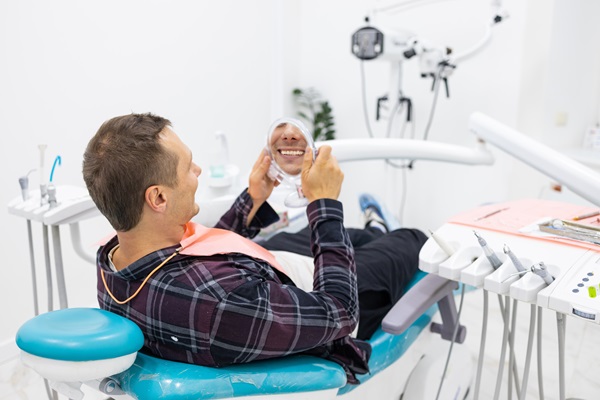Dental Sedation for the Geriatric Patient

There are dental practices that offer dental sedation for older patients. Even the elderly sometimes experience anxiety when they go to the dentist.
Sedation dentistry allows a dental practitioner to put phobic patients at ease while they sit in the dentist’s chair. This dental specialty can be challenging, especially when a patient has a medical condition that needs to be taken into consideration. Older patients often have unique needs, like strict medication regimens, and health conditions, like hypertension, dementia or diabetes.
Dental sedation for older patients
It takes a skilled and knowledgeable dentist to practice dental sedation on geriatric patients. Here is how they make sure that their older patients have safe and painless procedures:
1. The dentist will explore the patient's medical history
A large percentage of older people are on some kind of treatment plan for a health condition. Usually, that treatment plan involves one or more sets of medication. A dentist that is certified in dental sedation will take the time to collect all of the patient’s medical information. This will often involve communication with the patient’s doctor.
Based on the patient’s medical history and their doctor’s input, the dentist will be able to choose a method of sedation that works for the patient. They will choose drugs that will not interact with the person’s medication. They will also choose a level of dental sedation that is most safe for their patient.
2. The dentist will be conservative in their use of sedation
Dentists, like all medical professionals, always choose the most conservative course of treatment. When it comes to dental sedation, a dentist will try their best to use the lowest level of sedation they can.
If a dentist needs to fill a cavity on an older person with a moderate level of dental phobia, the dentist will only use nitrous oxide. In contrast, if a patient suffers from dementia, the dentist may choose oral or IV sedation.
How a dentist ultimately sedates their patient will depend on the patient’s physical and mental state.
3. The dentist will monitor the patient’s vitals all through the procedure
Once a person’s doctor green-lights dental sedation, the dentist will perform sedation dentistry, keeping a close eye on the patient’s vitals until the sedative wears off. This is a vital aspect of sedation dentistry, and it is a large part of a dentist’s training.
A dentist that is certified and has experience performing dental sedation will have the skill needed to keep the patient comfortable and safe during treatments.
Old age is no reason to stop seeing the dentist
No matter how old we get, we still need to get routine checkups. For the people who cannot stand the sights, sounds and smells of a dental practice, dental sedation will make your dental visit easy and painless.
If you or a loved one has a phobia or a condition that can be mitigated with sedation dentistry, reach out to us and make an appointment. We will be happy to work with you and chart a way forward.
Get started today!
Request an appointment here: https://www.emersondental.com or call Emerson Dental Associates at (201) 620-9998 for an appointment in our Emerson office.
Check out what others are saying about our services on Yelp: Read our Yelp reviews.
Recent Posts
A toothache occurs when one or more of your teeth have been damaged, and it might be a sign that emergency dentist is needed. Toothaches are sometimes accompanied by a fever, and that is often a sign of an infection in or around a tooth.A dental infection is a serious health issue because the infection…
When considering full mouth reconstruction to restore oral health, it is important to learn about the process, including the choice to make. When multiple dental issues are present, a full mouth reconstruction is usually the best procedure to correct the problems and restore oral functions and one's appearance. Since there is a lot of information…
Dental implants are a great way to replace multiple missing teeth. A dental bridge is also a solution for multiple teeth replacement in many cases as well. By learning more about the pros and cons of each option, it will help you decide which treatment option is right for you. Missing teeth create a cosmetic, functional…
No one looks forward to tooth extraction, but sometimes it is necessary for a person's oral health. This is often the case with the last adult teeth to erupt, the wisdom teeth. Many people need to have one or more of their wisdom teeth removed because they are not coming in right, there is not…


